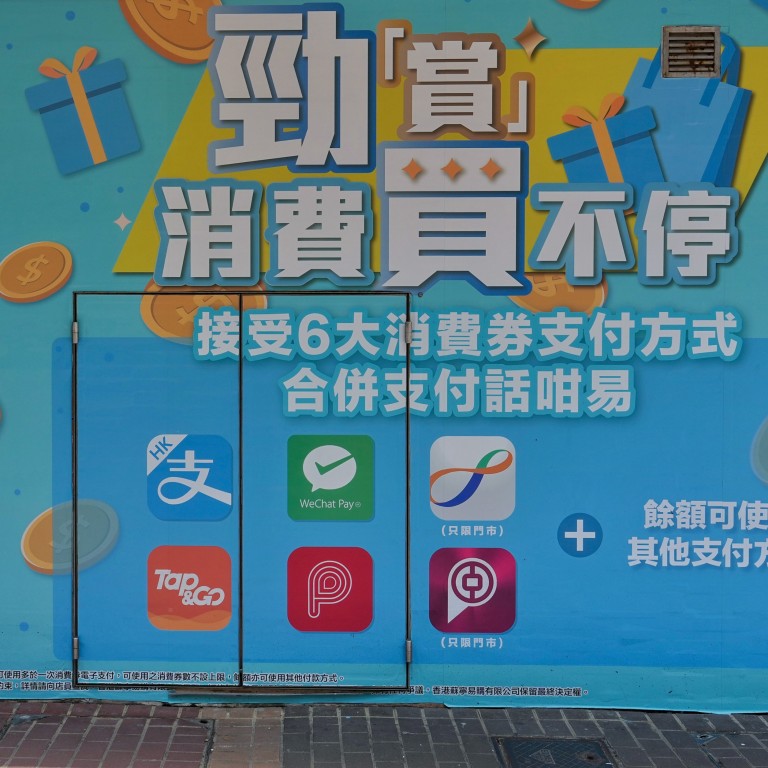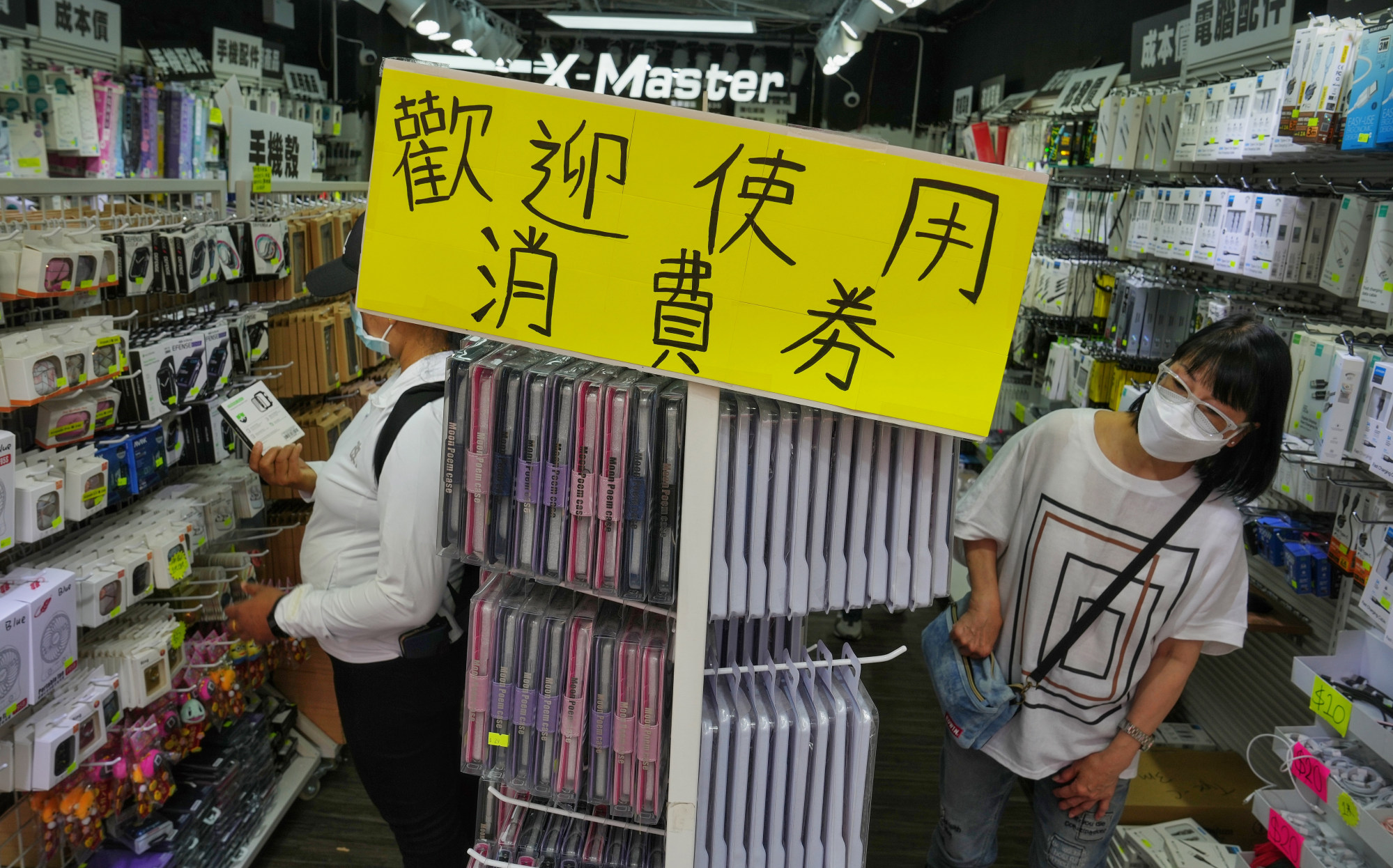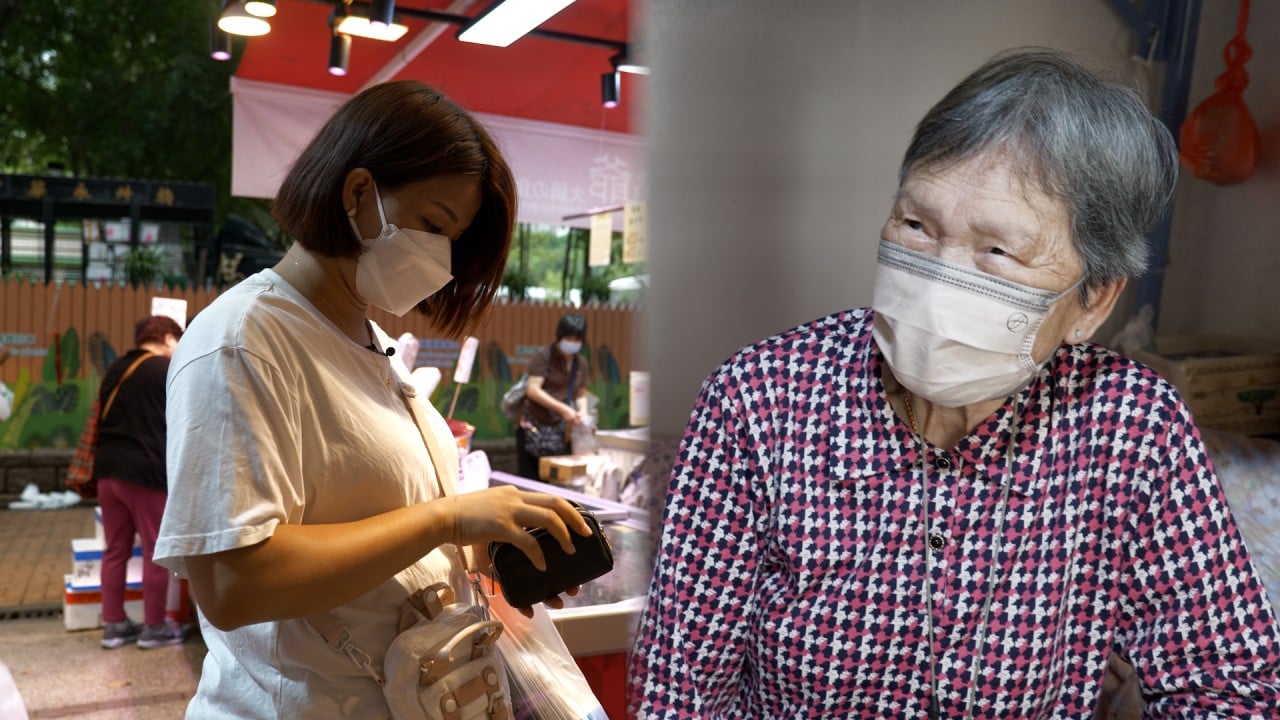
Hong Kong consumption vouchers: second instalment coming from July 16, says finance chief Paul Chan, adding long-term scheme ‘difficult’
- Finance chief Paul Chan says more large-scale public activities under ‘Happy Hong Kong’ campaign planned to help latest round of vouchers go further
- He stops short of saying the coming handout will be the last in scheme first launched in 2021 as coronavirus pandemic ravaged economy
Hong Kong residents will receive the second instalment of this year’s consumption vouchers on July 16, the finance minister has said, while again stressing that the scheme, which aims to give the economy a HK$13 billion (US$1.6 billion) spending boost, will not be a regular event.
“The pandemic has come under control this year, and there was a significant increase in tourists after Hong Kong reopened its borders with the rest of the world,” he said.
“We saw a boost in market conditions, especially for the restaurant sector, but retail remained sluggish. External market conditions remain unstable, especially as our exports continue to decline.”

It would be “difficult” to hand out vouchers recurrently over the long term as they were meant to give the economy a boost during extraordinary times such as the pandemic, and now the city was trying to recover, Chan added.
His remarks came as official figures released on Monday showed Hong Kong recorded its 12th consecutive month of decline in trade in April. The value of total exports fell 13 per cent to HK$338.3 billion while imports dropped by 11 per cent to HK$374.9 billion.
Chan on Monday said the latest e-voucher instalment, HK$2,000 for permanent residents and new arrivals aged 18 and above, would be disbursed from July 16, adding that more large-scale public events were in the pipeline to boost the effects of the handout.
Newly eligible applicants for the vouchers, such as those who turned 18 before or on Monday and anyone opting to change their payment platform, could apply for the handout between June 5 and 27.
Hong Kong e-vouchers ‘gone in a flash’, boosting retail and catering sectors
Those who had received the consumption vouchers previously and had no plans to switch payment platforms were not required to take any action, he added.
In this year’s scheme, permanent residents and new arrivals aged 18 and above are each entitled to e-coupons worth HK$5,000, with the first round of HK$3,000 disbursed in mid-April.
New arrivals refer to adults holding valid Hong Kong ID cards who have come from mainland China under a one-way permit – a document that allows them to live in the city – or were dependants of permanent residents with permission to stay in the city.
Those arriving under various work and talent schemes, as well as study programmes, are in line to receive HK$1,000, after the government last month disbursed HK$1,500 out of the promised HK$2,500.

Chan said around 100,000 non-permanent residents collected vouchers last year.
He also warned residents not to cash in their vouchers, saying police had found around 80 companies had been involved in such activities so far since the scheme was first introduced in 2021, with five arrests made.
“The consumption vouchers are meant to boost local spending. We have listened to a lot of feedback and the scope in which they can be used is extremely broad – there really is no need to cash them in,” he said.
Meanwhile, Ricky Chong Kwok-man, principal assistant secretary for financial services and the treasury, revealed that around 170,000 out of 240,000 people who were disqualified last year from claiming vouchers had successfully appealed to become eligible again.
They were thought to have moved elsewhere after being found to have taken out their Mandatory Provident Funds.
Hong Kong e-vouchers ‘gone in a flash’, boosting retail and catering sectors
These people were found to have relocated back to the city again, he said, adding he expected the number of disqualification cases would drop this year.
Gary Ng Cheuk-yan, a senior economist at Natixis Corporate and Investment Bank, cast doubt on the e-voucher scheme’s effectiveness in boosting the economy.
“The government has currently broken down the distribution into little pieces at a time – if they were doled out in one go, the vouchers might have triggered more large purchases which could help boost the economy,” he said.
“Right now they are being treated as small supplements to people’s everyday spending, like in transport or bills.”
Chan on Monday defended the effectiveness of the scheme in helping small businesses, saying it was found that around 90 per cent of vouchers distributed so far had been used on small purchases under HK$2,000.
Ng said while the vouchers were better than nothing, the biggest factor in the city’s current recovery was still the return of normal economic activity post-pandemic, which included tourist spending making a comeback.
Chan earlier said the government estimated the e-coupons would boost gross domestic product by 0.6 per cent.
The consumption voucher scheme was first rolled out in 2021, with eligible residents each receiving e-coupons worth HK$5,000.
Under the city’s fifth coronavirus wave last year, the amount was doubled to HK$10,000 to encourage spending to support the economy.
But the value of this year’s sweeteners has been halved to HK$5,000.
‘Happy Hong Kong’ campaign, consumption vouchers should boost economy: city leader
In his budget speech in February, Chan said the reduced amount was the most authorities could offer, given the tough economic situation and the government’s financial position.
The six payment platform providers enrolled in the scheme are Octopus, Bank of China’s BOC Pay, HSBC’s PayMe, AlipayHK, Tap & Go and WeChat Pay HK.
AlipayHK is owned by Ant Group, which is an affiliate of Alibaba Group Holding, the owner of the South China Morning Post.


